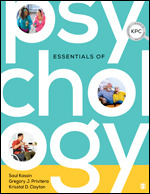You are in: North America
Change location
You are here
Tips and Tricks for Student Success

Tips and Tricks for Student Success: The Basics*
From A Guide to Student Success: Part 1
Textbooks typically do not provide a “How-to-Rock-This-Class Manual,” yet every student would love to have one. How do you study efficiently? How do you know what to say to your professors? Who can you reach out to for help? What strategies can you use to be a successful student? If these types of questions are what students seek answers for, then this guide is a great place to start. So, let’s start at the very beginning—the basics:
- It is important to want to be a great student. Being a great student does not mean getting straight As, but it does mean that you are truly committed to learning. As a student, you should embrace the opportunity to learn, be genuinely curious about the information being taught, and take the time to study it, question it, and think critically about it. This perspective captures the spirit of what it means to be a great student.
- Take the time on the first day of class to introduce yourself to your professor and teaching assistants (if applicable). Whether your class is online, in person, or a hybrid course, go out of your way to introduce yourself. Your professors are more than just teachers. They are experts in their fields of study, and this makes them excellent people to connect with. Additionally, getting to know your professors can benefit your learning in class and even into your career as possible people you can reach out to for a professional recommendation.
- Attend each class session if it is in a synchronous or face-to-face format. What is taught in class is very often the bulk of the material that is tested and/or assessed. Not only are you putting your best foot forward by attending each class session, but you are also doing your due diligence to be a great student and setting yourself up for success. If your class is asynchronous (fully online), then make sure you watch each lecture. Professors who teach asynchronous classes offer good information in the recorded lectures, and it is important to watch the full lecture—from beginning to end—so that you are not missing important information.
- Be prepared—have your materials ready, put your distracting technology away, and read before attending class. If you are in a fully online class, the same rules apply. When you are ready to watch your lecture, put the technology away. Research has demonstrated that being distracted because of multitasking—specifically by looking at your phone at the same time you are listening to a lecture—lowers your performance and retention. Students often think they are good at multitasking, but the science says that’s not accurate.
Next - Part 2: Getting the Most Out of Your Course
*Sources:
Essentials of Psychology
Saul M. Kassin
Gregory J. Privitera
Krisstal D. Clayton
Psychology, Seventh Edition
James S. Nairne
Dawn M. McBride
Introduction to Psychology
Tips for Student Success
- Guide Contents
- Tips and Tricks for Student Success: The Basics
- Getting the Most Out of Your Course
- Understanding Your Course Materials
- Best Practices for Studying and Preparing for Tests
- Creating School-Work-Family Balance
- Effective Distance Learning
- Helpful Resources to Help You Succeed
- Making the Most Out of Your Professor’s Office Hours
- Summary of Helpful Tips
Now available!
Learning Platform




